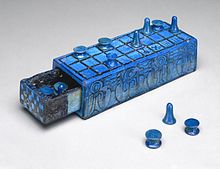Portal:Games
The Games Portal

A game is a structured type of play, usually undertaken for entertainment or fun, and sometimes used as an educational tool. Many games are also considered to be work (such as professional players of spectator sports or games) or art (such as jigsaw puzzles or games involving an artistic layout such as Mahjong, solitaire, or some video games).
Games are sometimes played purely for enjoyment, sometimes for achievement or reward as well. They can be played alone, in teams, or online; by amateurs or by professionals. The players may have an audience of non-players, such as when people are entertained by watching a chess championship. On the other hand, players in a game may constitute their own audience as they take their turn to play. Often, part of the entertainment for children playing a game is deciding who is part of their audience and who is a player. A toy and a game are not the same. Toys generally allow for unrestricted play whereas games present rules for the player to follow.
Key components of games are goals, rules, challenge, and interaction. Games generally involve mental or physical stimulation, and often both. Many games help develop practical skills, serve as a form of exercise, or otherwise perform an educational, simulational, or psychological role. (Full article...)
Selected article -
Starweb (or StarWeb) is a closed-end, space-based, play-by-mail (PBM) game. First published by Flying Buffalo Inc. in 1975, it was the company's second PBM game after Nuclear Destruction, the game that started the PBM industry in 1970. Players today can choose a postal mail or email format. Fifteen players per game assume one of six available roles and explore and conquer planets within a universe comprising 225 worlds. The object of the game is to attain a predetermined number of points which are generated by various actions during gameplay. Multiple game variants are available. Starweb is still available for play as of 2021 through the company Rick Loomis PBM Games.
Starweb has received numerous reviews from the 1970s to the 21st century with positive and negative comments. Reviewer and game designer Timothy B. Brown stated in 1990 that "StarWeb is arguably the best-loved, most widely known play-by-mail game in history," and the editor of Flagship magazine said in 2009 that it was "one of the best turn-based games ever". The game has won awards across multiple decades from the 1980s to the 21st century. These include the 1984 Charles S. Roberts Award for Best Play-by-Mail Game, the 1997 Origins Award for Best Ongoing Play-by-Mail Game, the 2000 and 2003 Origins Awards for Best Play-by-Mail Game, and the 2006 Origins Award for Play By Mail Game of the Year. (Full article...)Did you know? -
- ...that in 1967, Mac Hack became the first computer chess program to defeat a person in tournament play?
- ...that a reviewer called the narrator in the game Defenders of Ardania (pictured) "booze-obsessed", with a voice that sounds like "a Dalek doing an impression of Sean Connery"?
- ...that snooker player Stephen Maguire won his first ranking tournament at the 2004 European Open in Malta?
- ...that the Crawford-Gilpin House is alleged to have once changed owners due to being lost as a wager in a poker game?
- ...that The Big Bang Theory episode "The Santa Simulation" features a Christmas-themed Dungeons & Dragons game?
General images
Subcategories
Related portals
WikiProjects
Things to do
Selected picture

Chess prodigy Samuel Reshevsky, aged 8, defeating several chess masters in France
Associated Wikimedia
The following Wikimedia Foundation sister projects provide more on this subject:
-
Commons
Free media repository -
Wikibooks
Free textbooks and manuals -
Wikidata
Free knowledge base -
Wikinews
Free-content news -
Wikiquote
Collection of quotations -
Wikisource
Free-content library -
Wikiversity
Free learning tools -
Wiktionary
Dictionary and thesaurus



















































